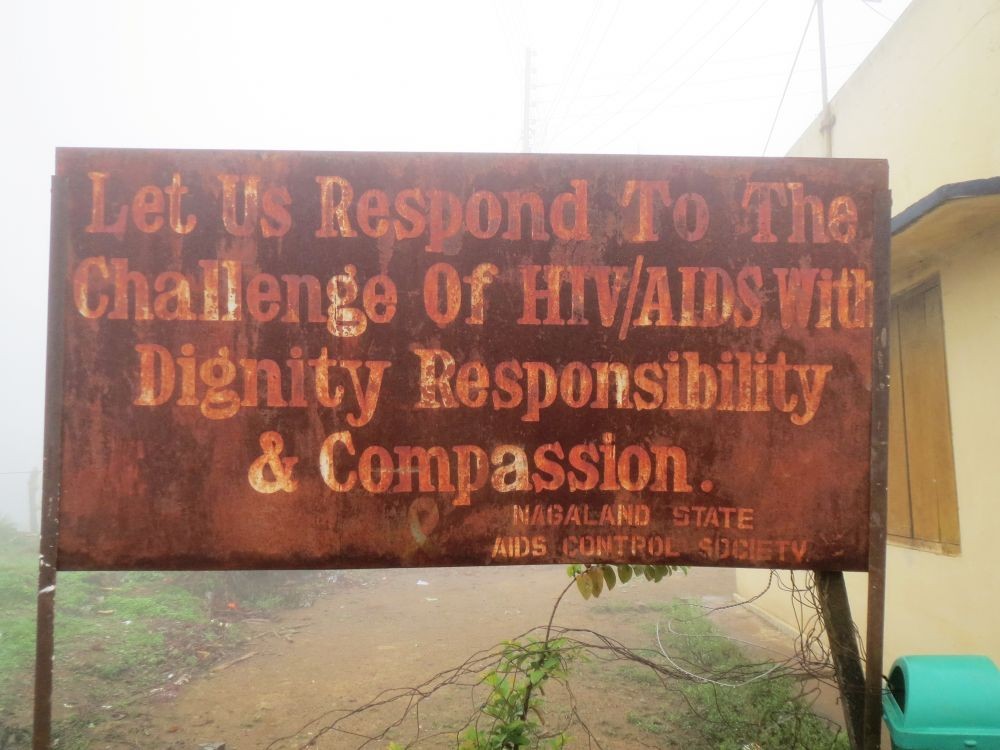Morung File Photo

Longrangty Longchar
Mokokchung | February 18
While HIV/AIDS and its related issues have become a threadbare subject of discussion in almost all places in Nagaland, the topic still remains a burning one for the NGOs working in the field of HIV/AIDS in Mokokchung. There are fears that the disease is spreading rapidly among the populace of the district thanks to stigma, discrimination and indifference on the part of its citizens.
Expressing deep concern during an interaction with this journalist at his residence, president of the Network of Mokokchung People Living with HIV/AIDS (NMP+), Toshi Sangpe said that out of the 800 people who tested positive in ICTC, Civil Hospital Mokokchung, since 1999 till date, only 145 PLHAs (People living with HIV/AIDS) are registered members of the NMP+. Sangpe said that hardly fifty among the 800 positive people might have died, which means that the remaining unknown persons who were tested positive during the period 1999 till date, who refuse to openly declare their status might be somewhere in the society and “knowingly or unknowingly” spreading the disease.
Saying that one cannot identify a person who is infected with the disease, Sangpe said that common citizens have a false picture of the PLHA as a ‘thin, dark and sickly person’, which is not true. He pointed out that a PLHA may be a healthy person who would look like a normal person without any sickness. Therefore, it is necessary for the PLHA to come out and declare their status, for the sake of controlling the spread of the disease, and for their own sake, so that they can avail the various Anti Retroviral Therapies (ART) and other programs.
Besides, the NMP+ president also disclosed that Mokokchung has an alarming prevalence rate of 3.5 percent, which is much above the national average. The prevalence rate in Tuensang district which at one point was the highest in Nagaland, has now decreased since the positive people in the district have come out openly regarding their status and taken preventive measures so as not to spread the disease further. However, in Mokokchung, the reluctance of the HIV positive patients to come out openly in society is hampering the efforts to control the disease, Sangpe said.
In this regard, Sangpe pointed out stigma and discrimination as the main reason why people are afraid to come out in the open with their status. He confessed that even when a positive person wants to come out in the society after being educated and encouraged by the NGOs working in the field of HIV/AIDS, the relatives and family members of the PLHA discourage him from declaring his status thinking that it might bring shame and infamy on the family. He also cited an instance where a landlord refused to let out his house to a member of the NMP+ a few years back, simply because the PLHA declared his status.
However, Toshi Sangpe, citing examples of other European countries, strongly maintained that coming out in the open and declaring his or her HIV status is the first way to control the spread of the disease. In addition, he stressed, in order to facilitate the PLHAs to declare their status, the society must make every effort to remove the stigma and discrimination related with the disease and the patient.
In this regard, Sangpe pointed out that the church, which is the biggest institution in the Naga society, must take a proactive role and initiate seminars and workshops related with the disease where trained members of NGOs like the NMP+ can be resource persons to educate the masses with regard to the disease. Sangpe strongly opined that the church should take a more empathic and proactive stand since it is the biggest and most influential institution in Nagaland.
“When a PLHA speaks in an AIDS seminar, the response (from the public) is very good and it is more effective than the speech of a person who is not infected. Besides, when a PLHA speaks in the seminar, the elders advise the youngsters to take the PLHA as an example, and to lead a careful life,” said Sangpe. The NMP+ president also strongly maintained that if the people of Mokokchung, or for that matter any society, remain indifferent and try to ignore the issue which is becoming more serious by the day, then the situation would turn from bad to worse in the coming years. He said that HIV/AIDS in the society is “a reality”, and that it is a very serious problem which needs the attention of everyone in the society – the individual, politician, bureaucrat, the NGO and the Church.
It may be mentioned here that the NMP+, which is composed of people living with HIV/AIDS, was formally formed in November 2006; however, it became fully functional in June 2008. The NMP+ is an affiliated unit of the NNP+ (Network of Naga People Living with HIV and AIDS). The first case of HIV/AIDS was detected in Nagaland in 1990, and since then, Nagaland has been considered as one among the six Indian states with a high HIV/AIDS prevalence rate.
While in the past the spread of AIDS in the society was mainly due to using of unsterilised needles by drug users, at present, NGOs in Nagaland claim that with the deceasing number of drug users in the state, HIV/AIDS is spreading in the society due to indulgence in unprotected sex.
HIV/AIDS and related health issues is a growing reality and people cannot escape from it. The society becomes more vulnerable when it ignores or remains indifferent to the issue. Perhaps it is time that society once again renews its efforts to contain the disease with the cooperation of the public.






